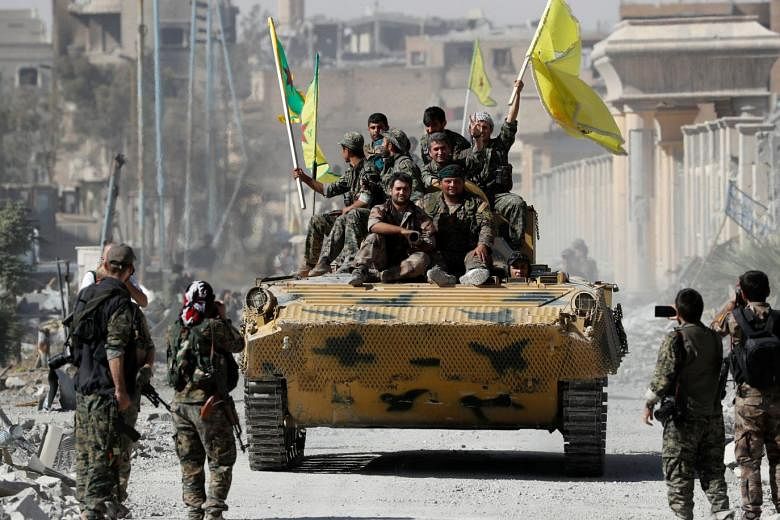RAQQA (Syria) • US-backed militias said yesterday that they had taken all of the northern Syrian city of Raqqa from the Islamic State in Iraq and Syria (ISIS), a major blow to the terror group which had long used it as the de facto capital of its self-declared caliphate.
Officers with the Syrian Democratic Forces (SDF), made up of Syrian Kurds and Arabs, said they had taken control of the city after a four-month campaign, although the US Central Command stopped short of declaring victory, saying that fighters were checking to make sure all areas were clear.
A formal victory declaration will be made soon, once the city has been cleared of mines and any possible ISIS sleeper cells, said SDF spokesman Talal Sello.
But celebrations had already begun in the city, where residents had lived under the repressive rule of militants who beheaded people in a central square for offences as minor as smoking or communicating on the Internet without permission.
Raqqa was the first big city ISIS captured in early 2014, before its rapid series of victories in Iraq and Syria brought millions under the rule of its self-declared caliphate.
It used the city as a planning and operations centre for its attacks in the Middle East and elsewhere in the world. Western hostages were, for a time, imprisoned in the city, then executed and the grisly killings captured on videos which were distributed online.
Thousands of young men, and a few women, flocked to Raqqa from the United States, Europe and Arab as well as South-east Asian countries, including doctors, IT specialists and engineers, many drawn by ISIS' initial portrayal of itself as a defender of fellow Sunnis against Syrian leader Bashar al-Assad's Alawite-dominated forces.
The fall of Raqqa is a potent symbol of the terror group's collapsing fortunes. It lost control of its most important bastion in neighbouring Iraq - Mosul - three months ago, and is now reduced to a guerrilla force in its former heartlands.
The militants have been driven out of all of Iraq's cities and are now concentrated on the Iraq-Syria border and in some towns in western Anbar province.
The focus in Syria will now switch to the south-east and ISIS' final piece of significant territory in Deir Ezzor province, where Syrian government forces backed by Russian air strikes and militias allied with Iran have made advances in recent weeks.
The battle against ISIS has consumed the region and led to uncomfortable alliances between domestic rivals like Kurds and Arabs in both Iraq and Syria.
It has led to even touchier de facto partnerships internationally, with the US, Russia and Iran all fighting the militant group in sometimes competing efforts and vying for influence in the aftermath.
More than 1,000 civilians have been killed in the fighting for Raqqa, according to tallies by local activists and international monitors, and much of the city now lies in ruins.
Dr Mohammad Ahmed Saleh, a resident working in a hospital in the nearby city of Tall al Abayad, said he was eager to get home, but bracing himself for what he might see.
"I am expecting to see a new Hiroshima," he said by phone.
REUTERS, AGENCE FRANCE-PRESSE, NYTIMES

